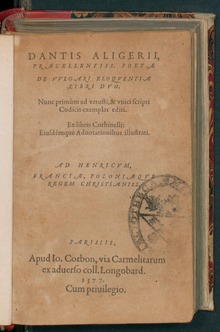
Back دي فولغاري إيلوكينشيا Arabic O rodném jazyce Czech De vulgari eloquentia German De vulgari eloquentia EML De vulgari eloquentia Esperanto De vulgari eloquentia French डी वल्गारी एलोक्वेंटा Hindi De vulgari eloquentia ID De vulgari eloquentia Italian 俗語論 Japanese

De vulgari eloquentia (Ecclesiastical Latin: [de vulˈɡari eloˈkwentsi.a], Italian: [de vulˈɡaːri eloˈkwɛntsja]; "On eloquence in the vernacular") is the title of a Latin essay by Dante Alighieri. Although meant to consist of four books, it abruptly terminates in the middle of the second book. It was probably composed shortly after Dante went into exile, circa 1302–1305.
In the first book, Dante discusses the relationship between Latin and the vernacular languages, and the search for an "illustrious" vernacular in the Italian area; the second book is an analysis of the structure of the canto or song (also known as canzuni in Sicilian), which is a literary genre developed in the Sicilian School of poetry.
Latin essays were very popular in the Middle Ages, but Dante made some innovations in his work: firstly, the subject (writing in vernacular) was an uncommon topic in literary discussion at that time. Also significant was how Dante approached this theme; that is, he presented an argument for giving vernacular the same dignity and legitimacy Latin was typically given. Finally, Dante wrote this essay in order to analyse the origin and the philosophy of the vernacular, because, in his opinion, this language was not something static, but something that evolves and needed a historical contextualisation.